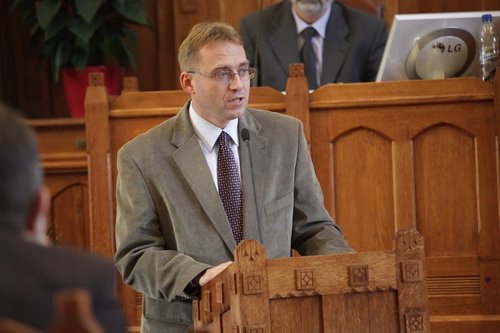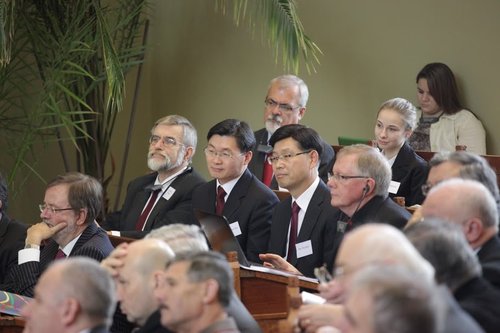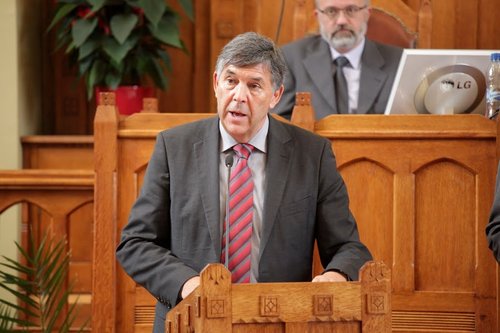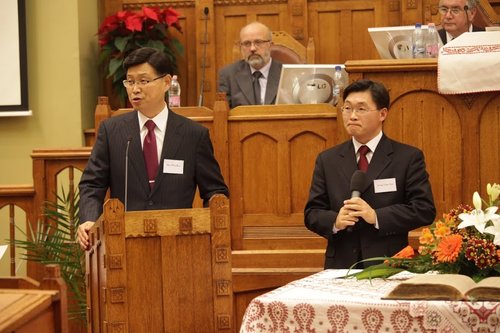The Movement of Reinterpretation: November Synod Meeting of the RCH
2012. november 26., hétfőThe Synod of the Reformed Church in Hungary (RCH) convened for its fall session to discuss, aside from business matters, the vision of the church as it faces an unprecedented time of social change and economic unrest. In his opening address to the Synod, Bishop Gusztáv Bölcskei mirrored this, saying that the Synod is constantly discussing things that are changing, and it is through this reinterpretation that movement occurs and brings about a spark within the church.
The Synod took several strides during this meeting to address these issues. First off, the newly formed Church Revision Committee (CRC) presented its preliminary report. At the last Synod meeting, the executive body stated an intention to evaluate the church's activities over the last two decades, an altered social framework, as well as the formal and substantial changes of service in obeying the Lord on both a Biblical and confessional basis, and lastly, discern necessary steps to proceed accordingly. András Harmathy, convener of the CRC, put it this way as he addressed the Synod, "The church is a social entity ordained by God, its mission set by Jesus. This in itself is a double reality that creates tension." He went on to say that in light of current times, the RCH must reexamine and rediscover its inner and outer structure, its crisis, damage, and in what light to present these findings.

The first step the committee took was to determine the fundamental theological basis of the church's vision, which the committee agreed, should be a reformulating and reconfirming outlook on the church's existing confessions based in Scripture. Next, it sent a letter to the Presidium of the RCH expressing a need for reputable sociological research to fulfill its initial mission. The CRC also presented a unanimous agreement that a comprehensive analysis of the financial management of the church was necessary, specifically self-sustainability of congregations and estimation of funds for a possible reform. These decisions and the positive response of the Presidium lead to another submission presented to the Synod concerning the implementation of a sociological research plan.
The CRC as well as the sociological research study were both affirmed by the Synod. The committee will draft a plan for February 2013 that includes dialogue and discussion with congregations, pastors, presbytery-level bodies and experts in certain fields. It aims to reflect the opinions of local communities, because as Harmathy said, "The church is a church only to the extent that it is a sign and foretaste to God's kingdom, to and through its members. The church must be a communication of the Gospel to the community – in words and deed."

Another important step taken during the Synod session was the invitation of 11 international delegates from partner churches of the RCH. The challenges of today's church are not unique to Hungary they are global issues. The Synod welcomed representatives from its partner churches to share experiences and learn from the example of other Reformed institutions. Thomas Wipf, former President of the Community of Protestant Churches in Europe and current Moderator of the European Council of Religious Leaders, gave a speech relating his experiences in Switzerland. "We can only preserve our identity if we look to the future," he said. Wipf described a sociological study similar to the CRC's proposed study that delved into the challenges affecting churches in Switzerland. He explained that eight trends and processes were found, and described several of them to the Synod. Wipf concluded with this, "It's not about administering a legacy – it would be a dead thing. It's the here and now that we must focus on. God is the creator and as he is creative, church structures must also change. Tradition does not mean the keeping of ashes but the passing down of flames."

Following this, the Synod made another stride toward revitalization with a historic decision to incorporate the Budapest Korean Presbyterian Church into the RCH. An amendment of the Constitution was necessary, and passed, to accept the agreement between the churches. After the decision, Rev. Hur Won Koo, Head of Worldwide Mission Ministry Department for the Presbyterian Church in Korea (PCK), addressed the Synod and expressed his joy that he was able to be present for the incorporation. This bi-lateral agreement between the RCH and the PCK allows both churches to look toward the future and toward a strengthened partnership.

Finally, the Synod drafted several guiding points as it looks toward its next year of service in the Carpathian Basin. The Synod Working Plan finds its biblical foundation in 2 Corinthians 5: 9-20. And it is here in Paul's message that the RCH reinterprets and defines its direction in mission for the future and finds its focus during this reevaluation – to become "Ambassadors for Christ."
Read here the Brief Report of Synod Resolutions
Amy Lester
Contact us
Click here if you are interested in twinning.
Reformed Church in Hungary
Address: H-1146 Budapest, Abonyi utca 21.
PO Box: 1140 Budapest 70, Pf. 5
Email: oikumene@reformatus.hu
English, German and Korean language services in Budapest
Links
Recommended articles
-
Pastoral Letter in the Light of the Pandemic
Bishop Dr. István Szabó sent a pastoral letter of encouragement to the ministers serving in RCH’s congregations, expressing his gratitude for the persistence and creativity of the pastors.
-
RCH Joins in Pope's Call for Prayer
RCH published the call on congregations to join the initiative of Pope Francis, supported by ecumenical organisations, to unite in praying the Lord’s Prayer on Wednesday, 25 March, at noon.
-
English Speaking Worship Services Online
Each Sunday at 11 AM (CET) the St. Columba's Church of Scotland in Budapest, the international community of RCH invites you to join the worpship service on its facebook page.
-
Test of Humanity and Companionship
Reformatus.hu asked Dr. György Velkey, Director General of the Bethesda Children’s Hospital of RCH about the challenges of health care workers and ways of prevention against the pandemic.
-
All Church Events Suspended
In light of the coronavirus the Presidium of RCH requested congregations to suspend all church events with immediate effect. Beside restrictions, it calls for prayer, sobriety and responsibility.











